Propagandists misrepresent peer-reviewed papers and ICD-11 search features to fuel false claim that WHO’s ICD-11 “rejected porn addiction and sex addiction”
The deniers of porn addiction are agitated because the latest version of the World Health Organization’s medical diagnostic manual, The International Classification of Diseases (ICD-11), contains a new diagnosis suitable for diagnosing both porn addiction and sex addiction. It’s called “Compulsive Sexual Behavior Disorder.” For a responsible article quoting Geoffrey Reed, the head of Mental Health Disorders for the ICD-11, see “WHO recognises ‘compulsive sexual behaviour’ as mental disorder.”
Nonetheless, in a bizarre “we lost, but we won” propaganda campaign, the deniers are pulling out all the stops to spin this new diagnosis as a rejection of both “sex addiction” and “porn addiction.” Their assertion is nonsensical, as:
- Neither the ICD-11 nor the DSM5 ever use the word “addiction” to describe an addiction – whether it be gambling addiction, heroin addiction, cigarette addiction or you name it. Both diagnostic manuals use the word “disorder” instead of “addiction” (i.e. “gambling disorder” “nicotine use disorder”, and so on). Thus, “sex addiction” and “porn addiction” could never have been rejected, because they were never under formal consideration in the major diagnostic manuals. Put simply, there will never be a “porn addiction” diagnosis, just as there will never be a “meth addiction” diagnosis. Yet both pathologies can be diagnosed using the ICD-11’s provisions.
- “Compulsive Sexual Behaviour Disorder” (CSB or CSBD) functions as an umbrella term for “sex addiction” and “porn addiction”, and any other term you have seen used to describe compulsive sexual behavior, such as “hypersexuality,” “cybersex addiction,” “out of control sexual behavior,” etc. – provided patients/clients meet the criteria for CSBD.
- Nearly 41 recent neuroscience-based studies have been published on chronic porn users and those with CSB. All 41 report brain, neuropsychological, or hormonal alterations that mirror those seen in studies on substance addicts.
The following screenshot, circulating on pro-porn propagandist’s social media accounts (created by Nicole Prause), features the core piece of purported “evidence” that the ICD-11 “rejected sex addiction and porn addiction.” Excerpting a 2014 Jon Grant commentary, and counting on short attention-spans, the propagandists expect you to read only what’s in the red boxes, hoping you will overlook what the paragraph actually states:
If you fell for the red-box illusion, you misread the above excerpt as:
…pornography viewing… questionable whether there is enough scientific evidence at this time to justify its inclusion as a disorder. Based on the limited current data, it would therefore seem premature to include it in the ICD-11.
Yet that’s just a lie. Here’s the Jon Grant 2014 paper: Impulse control disorders and “behavioural addictions” in the ICD-11. Read the entire paragraph and you will see that Jon Grant is talking about “Internet gaming disorder” not pornography. Grant believed it was questionable whether there was enough scientific evidence at that time to justify Internet Gaming Disorder’s inclusion as a disorder:
A third key controversy in the field is whether problematic Internet use is an independent disorder. The Working Group noted that this is a heterogeneous condition, and that use of the Internet may in fact constitute a delivery system for various forms of impulse control dysfunction (e.g., pathological game playing or pornography viewing). Importantly, the descriptions of pathological gambling and of compulsive sexual behaviour disorder should note that such behaviours are increasingly seen using Internet forums, either in addition to more traditional settings, or exclusively 22,23. The DSM-5 has included Internet gaming disorder in the section “Conditions for further study”. Although potentially an important behaviour to understand, and one certainly with a high profile in some countries 12, it is questionable whether there is enough scientific evidence at this time to justify its inclusion as a disorder. Based on the limited current data, it would therefore seem premature to include it in the ICD-11.
Without reading only the red squares, the above excerpt reveals that Jon Grant believes that internet pornography viewing can be an impulse control disorder, and it falls under the umbrella diagnosis of “Compulsive Sexual Behavior Disorder” (CSBD). This is the exact opposite of the “red square” illusion tweeted by the propagandists.
Even if Jon Grant had actually said that compulsive porn use could not be classified under Compulsive Sexual Behavior Disorders, it would be irrelevant as (1) the paper is over 4 years old, and (2) it’s just Grant’s two cents, not an official position paper by the World Health Organization. Moreover, a lot has changed in the intervening 4.5 years. By the way, Internet Gaming Disorder is now in WHO’s ICD-11, under addictive behaviors.
First, 32 of the 39 neurological studies on CSB subjects listed on this page were published after the 2014 Jon Grant paper. Second, Jon Grant was a co-author on this 2018 paper announcing (and agreeing with) the inclusion of CSBD in the upcoming ICD-11: Compulsive sexual behaviour disorder in the ICD‐11. Third, in Jon Grant’s 2018 paper, “Compulsive sexual behavior: A nonjudgmental approach“, he says that Compulsive Sexual Behavior is also called “sex addiction”:
Compulsive sexual behavior (CSB), also referred to as sexual addiction or hypersexuality, is characterized by repetitive and intense preoccupations with sexual fantasies, urges, and behaviors that are distressing to the individual and/or result in psychosocial impairment.
No wonder the propagandists such as Prause are reaching back 4 years to misrepresent a Jon Grant paper: Grant’s recent 2018 paper states in the very first first sentence that CSB is sex addiction.
For an accurate accounting of the ICD-11, see this recent article by The Society for the Advancement of Sexual Health (SASH): “Compulsive Sexual Behaviour” has been classified by World Health Organization as Mental Health Disorder. It begins with:
Despite a few misleading rumors to the contrary, it is untrue that the WHO has rejected “porn addiction” or “sex addiction”. CSBD is an umbrella term that allows diagnoses of both “porn addiction” and “sex addiction” (as well as “hypersexuality” and “out-of-control sexual behavior”).
There’s also an article by YBOP that was published a few months ago: World Health Organization’s ICD-11: Compulsive Sexual Behavior Disorder
ANOTHER DAY, ANOTHER DECEPTIVE TACTIC
The day after YBOP posted the above section, porn addiction denier Nicole Prause stopped tweeting the deceptive “red square” screenshot and replaced it with an equally deceptive GIF where you can watch Nicole Prause search for “addiction” in the ICD-11 search box. Sure enough, the ICD system gives a few returns of “addiction” related to a few drugs, etc. Prause then lies, saying, “To be clear, ICD does use the term “addiction” extensively, but they specifically reject the term “addiction” for use with sex (or sex films).” Screenshot of Prause’s search:
KEY POINT: while the the word “addiction” (in red above) appears when searching – that word is nowhere to be found once you click on a disorder for an addictive drug. For example, consider “Disorders due to alcohol use”:
The ICD-11 search feature exists solely to help physicians (or other visitors) find Disorders. It points them to the correct Disorders if they (mistakenly) put in the word “addiction.” Once again, there is no condition in the ICD-11 labeled as an “Addiction,” and “Addiction” isn’t found in any of the sub-headings for addictive drugs or addictive behaviors. See screenshot below.
Due to the fierce politics surrounding the inclusion of “Compulsive sexual behavior disorder,” it is, for now, categorized under “Impulse control disorder,” just as gambling once was. This is controversial, and may change in the future, as explained by ICD insiders in this World Psychiatry paper.
Just to be clear, the new “Compulsive sexual behavior disorder” is suitable for diagnosing anyone who meets its criteria, and this includes sexual behavior addicts, pornography addicts, hypersexuals and those with out-of-control or compulsive sexual behavior. Again, see “WHO recognises ‘compulsive sexual behaviour’ as mental disorder, which quotes the man who heads up Mental Health Disorders” for the ICD-11, Dr. Geoffrey Reed.
Examples of Nicole Prause’s misrepresentation (and doctored picture) of Jon Grant’s 2014 paper
.
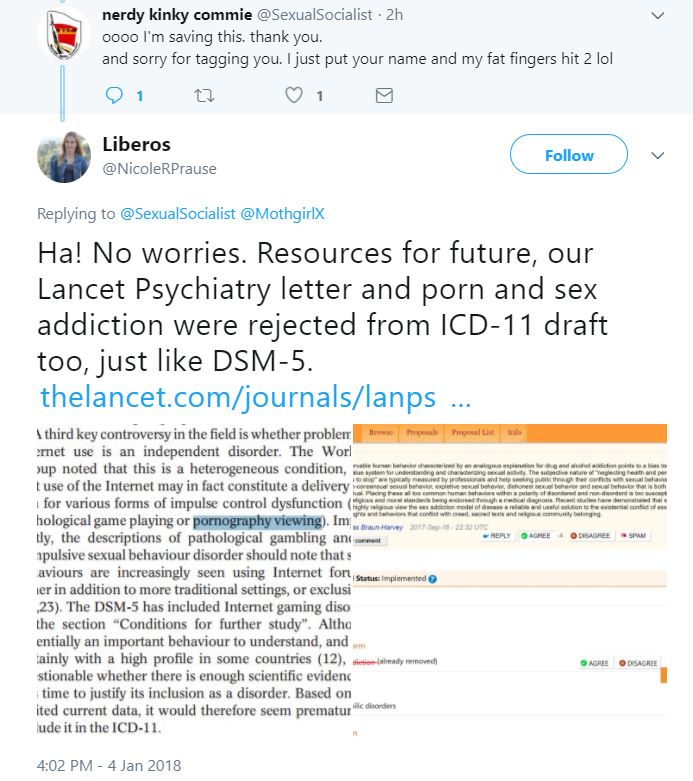
—
Links to Grant paper on quora
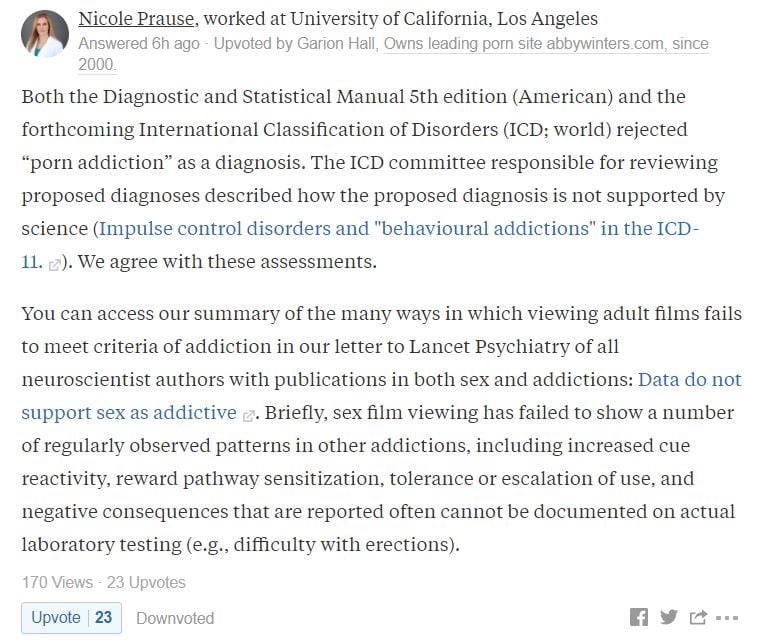
—
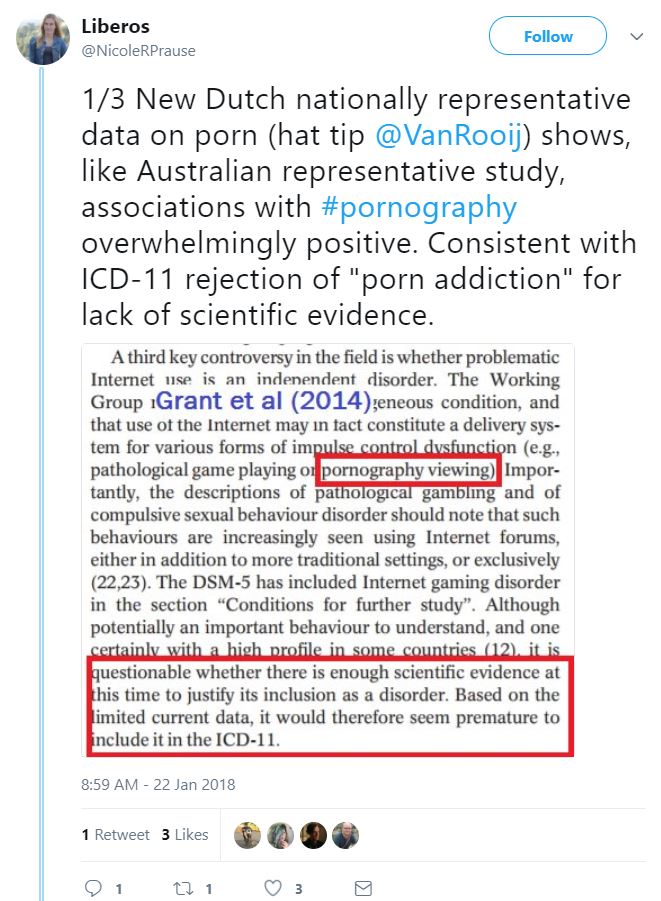
—

—
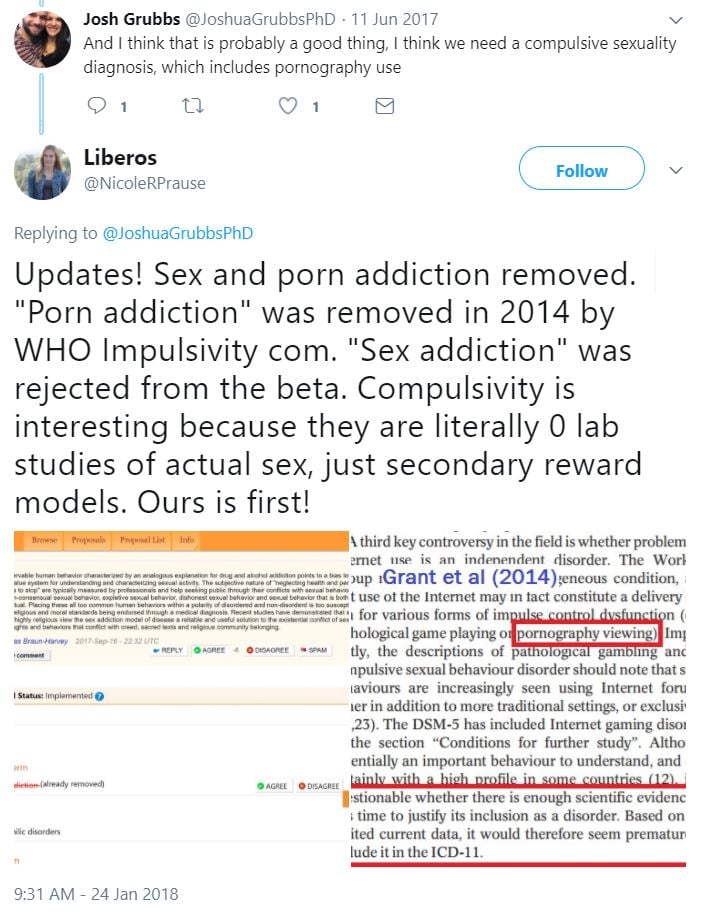
—

—
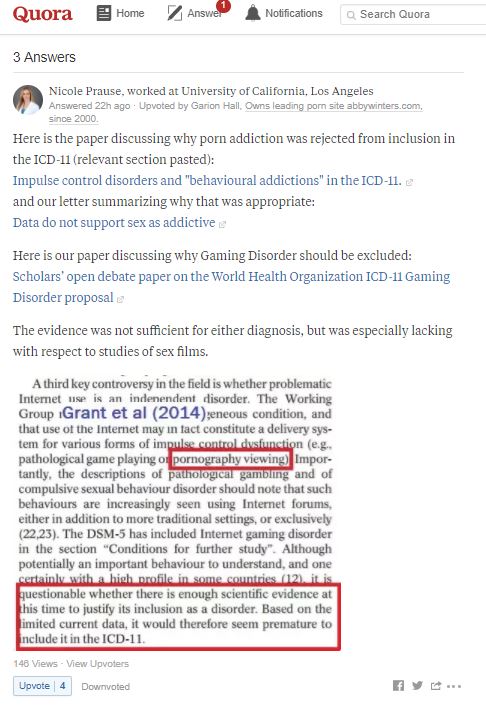
—
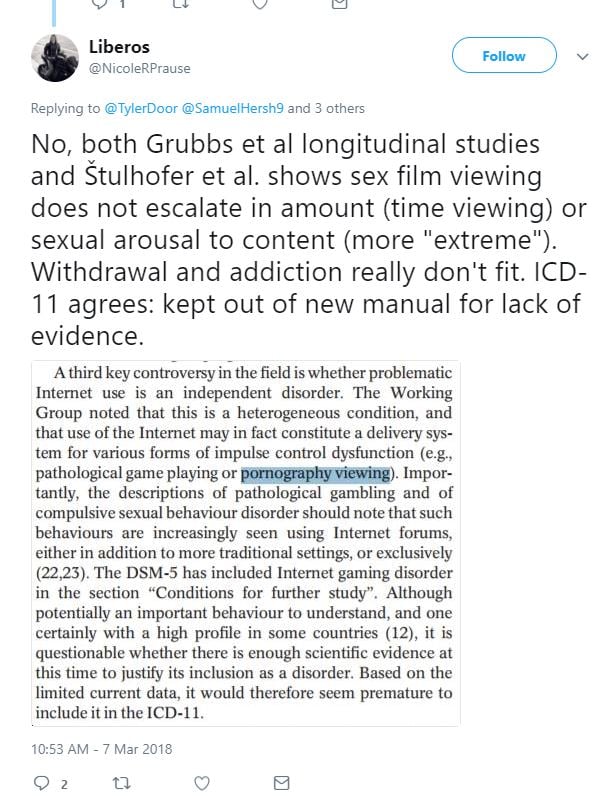
—
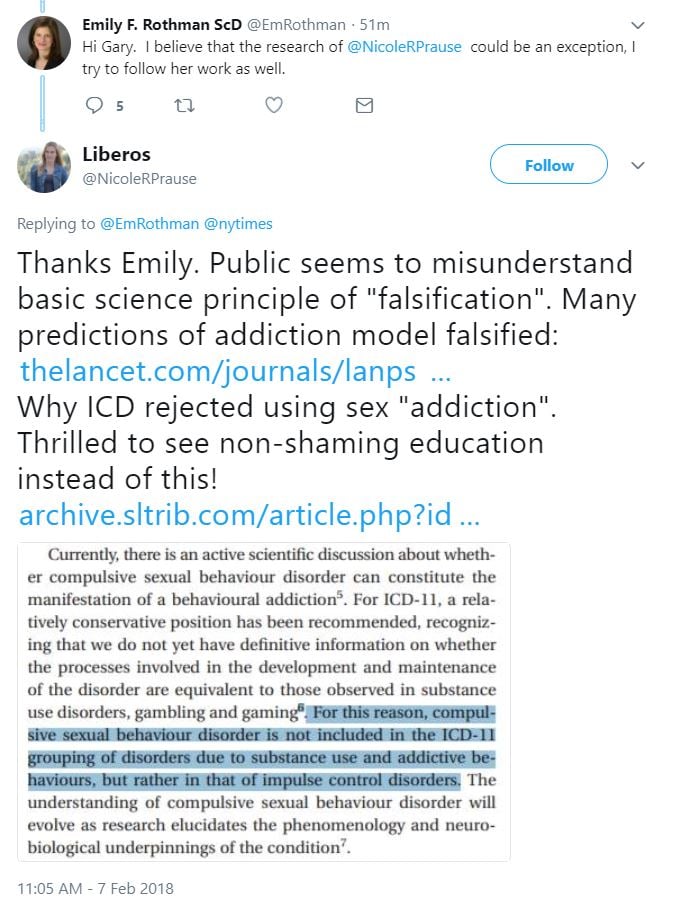
—
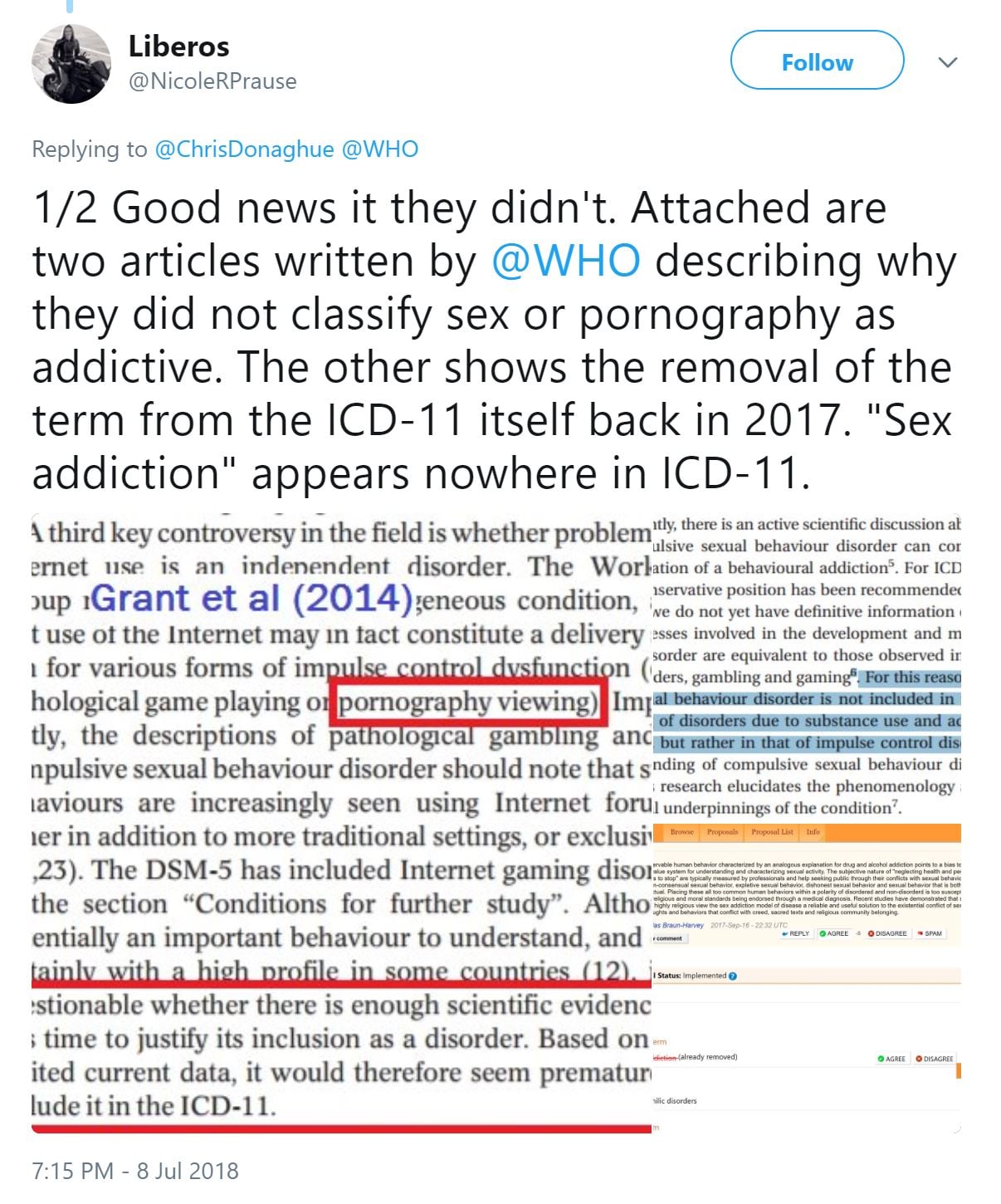
—
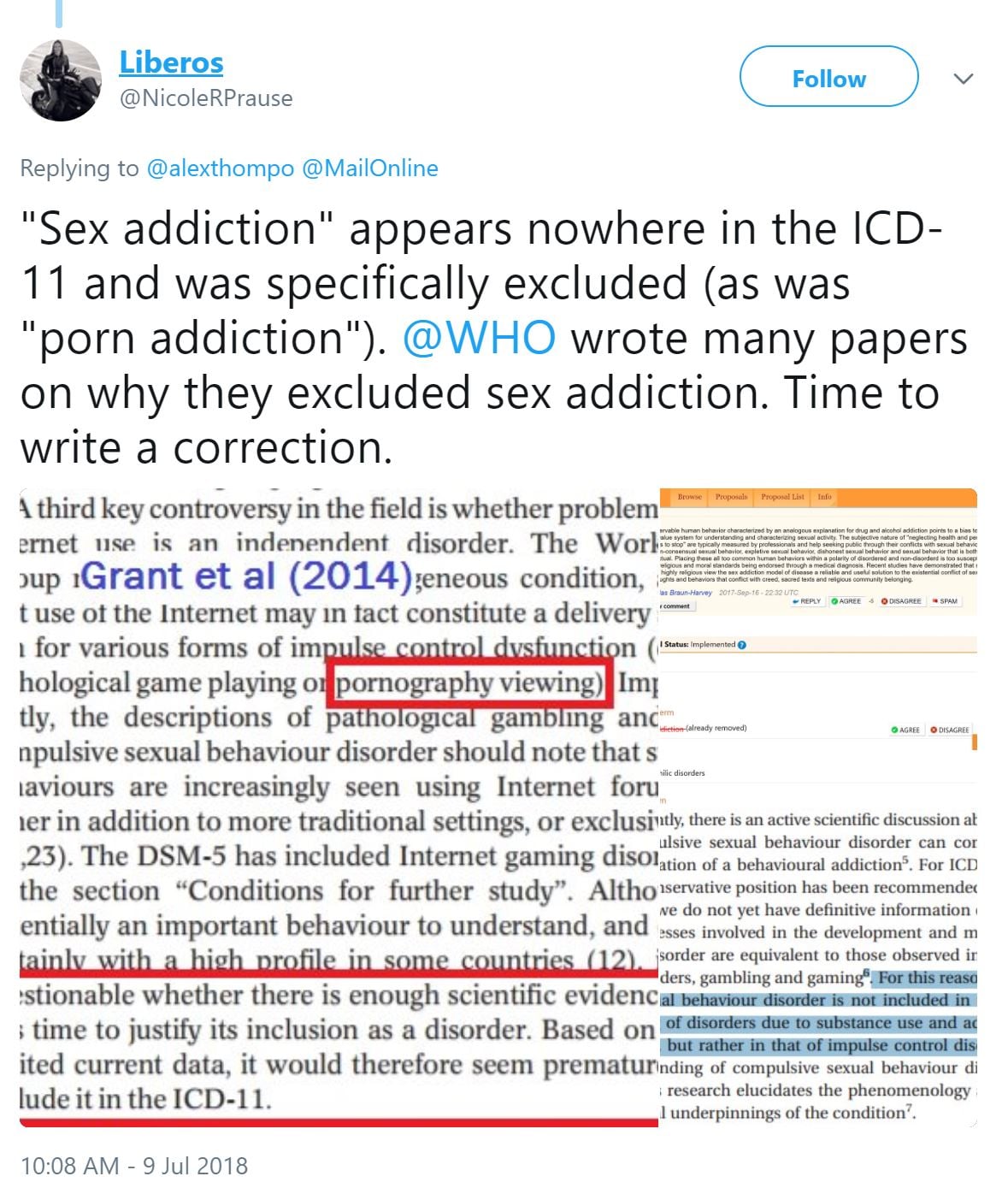
—
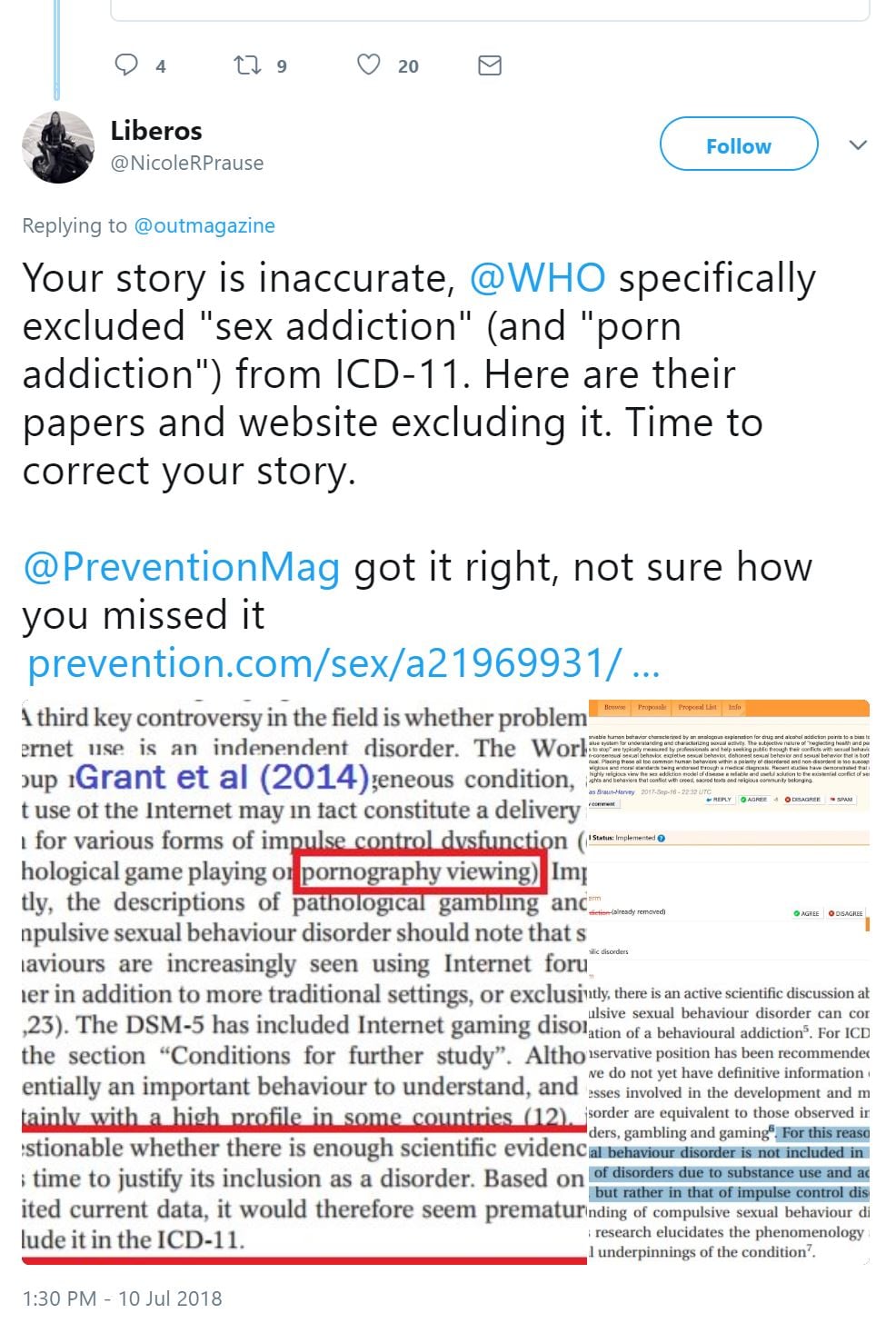
—
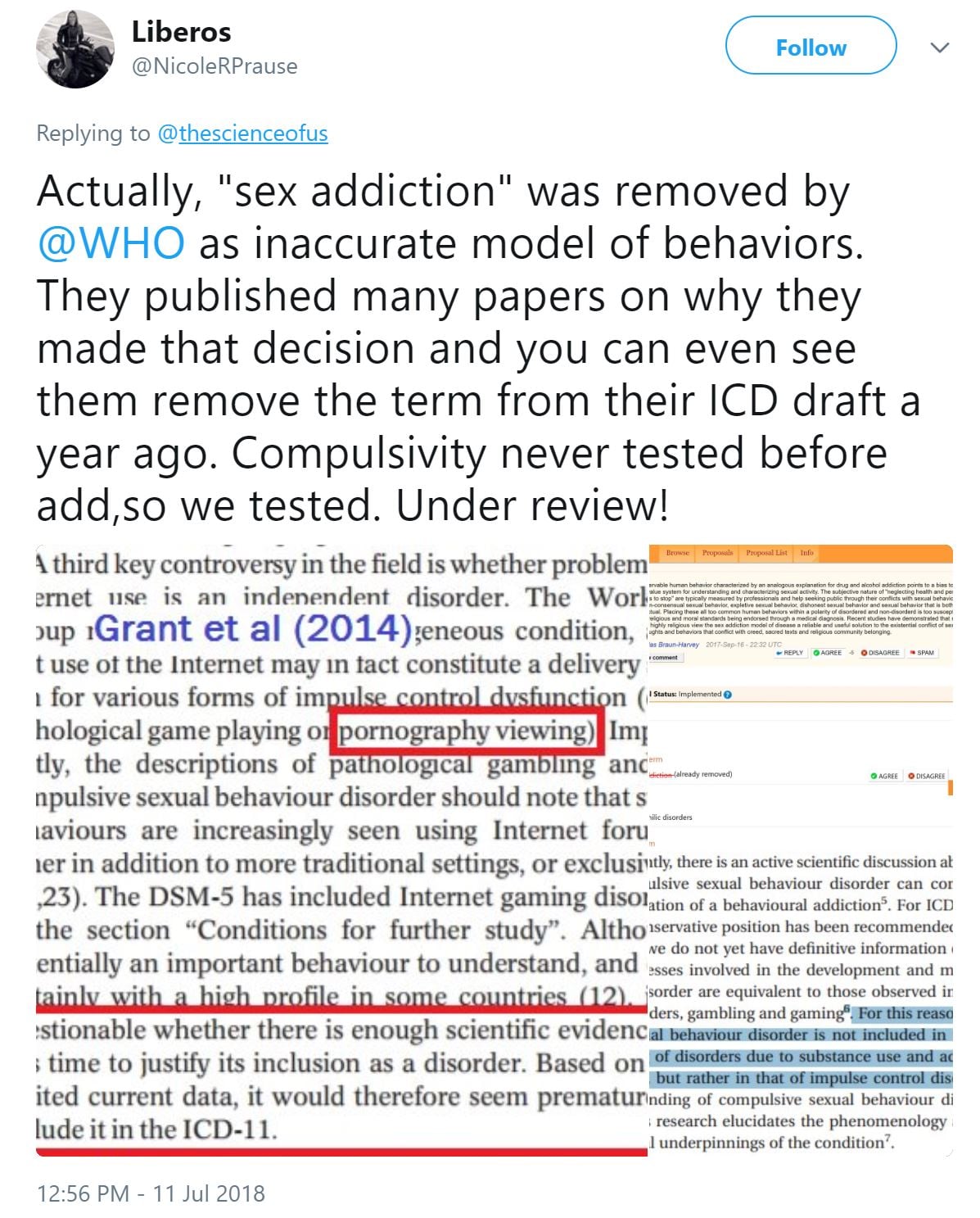
Copied and tweeted by one of her followers:
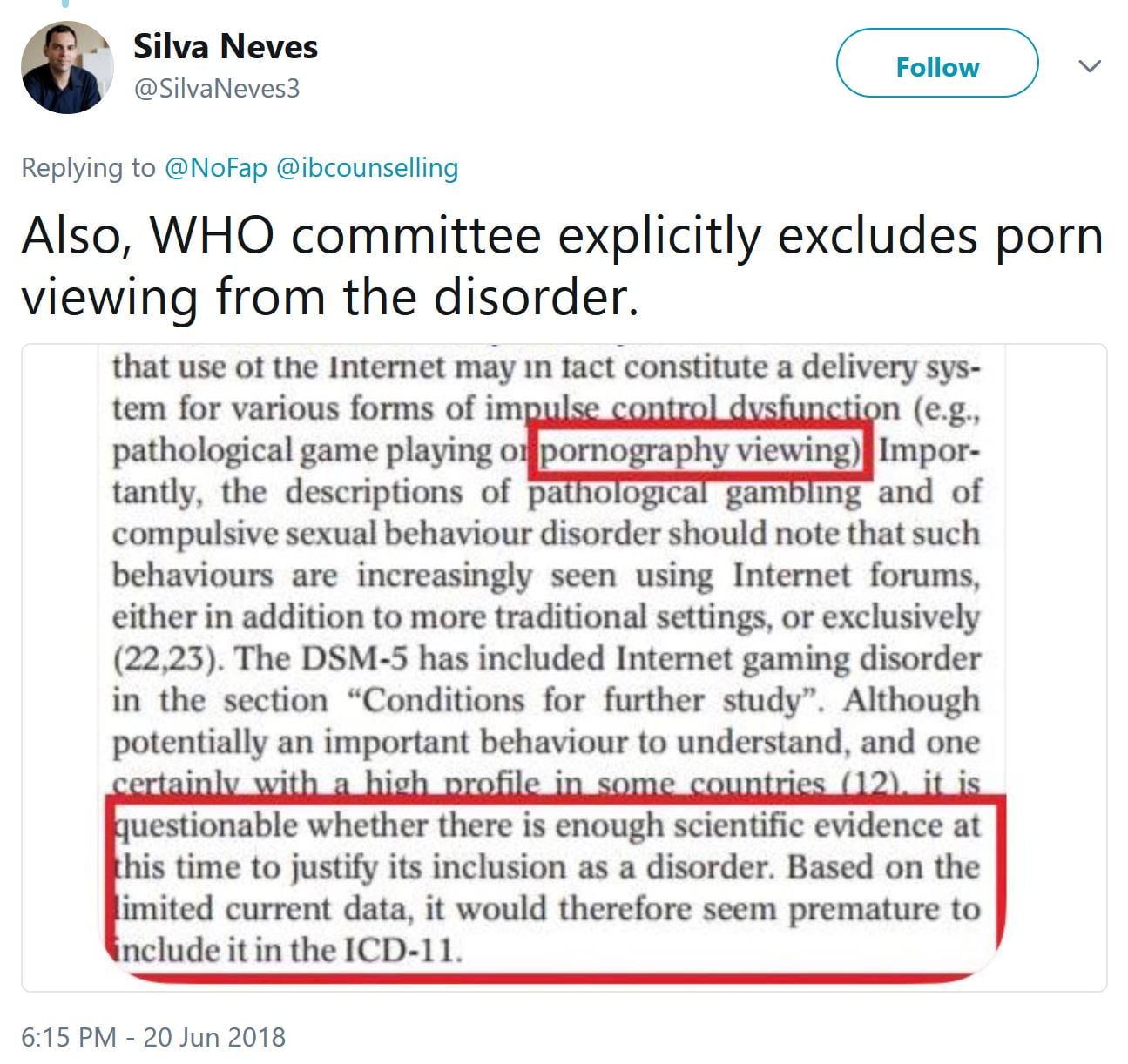
What’s Going on here?
UCLA did not renew Nicole Prause’s contract (late 2014/early 2015). No longer an academic Prause has engaged in multiple documented incidents harassment and defamation as part of an ongoing “astroturf” campaign to persuade people that anyone who disagrees with her conclusions deserves to be reviled. Prause has accumulated a long history of harassing authors, researchers, therapists, reporters and others who dare to report evidence of harms from internet porn use. She appears to be quite cozy with the pornography industry, as can be seen from this image of her (far right) on the red carpet of the X-Rated Critics Organization (XRCO) awards ceremony. (According to Wikipedia the XRCO Awards are given by the American X-Rated Critics Organization annually to people working in adult entertainment and it is the only adult industry awards show reserved exclusively for industry members.[1]). It also appears that Prause may have obtained porn performers as subjects through another porn industry interest group, the Free Speech Coalition. The FSC subjects were allegedly used in her hired-gun study on the heavily tainted and very commercial “Orgasmic Meditation” scheme. Prause has also made unsupported claims about the results of her studies and her study’s methodologies. For much more documentation, see: Is Nicole Prause Influenced by the Porn Industry?
